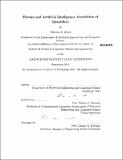| dc.contributor.advisor | Robert C. Berwick. | en_US |
| dc.contributor.author | Zhou, Samson S | en_US |
| dc.contributor.other | Massachusetts Institute of Technology. Dept. of Electrical Engineering and Computer Science. | en_US |
| dc.date.accessioned | 2013-02-14T15:35:24Z | |
| dc.date.available | 2013-02-14T15:35:24Z | |
| dc.date.copyright | 2011 | en_US |
| dc.date.issued | 2011 | en_US |
| dc.identifier.uri | http://hdl.handle.net/1721.1/76986 | |
| dc.description | Thesis (M. Eng. and S.B.)--Massachusetts Institute of Technology, Dept. of Electrical Engineering and Computer Science, 2011. | en_US |
| dc.description | Cataloged from PDF version of thesis. | en_US |
| dc.description | Includes bibliographical references (p. 49). | en_US |
| dc.description.abstract | This paper is concerned with constraints on learning quantifiers, particularly those cognitive on human learning and algorithmic on machine learning, and the resulting implications of those constraints on language identification. Previous experiments show that children attempting to differentiate quantifiers from numbers use a similar acquisition method for both types of words. However, some types of natural quantifiers, such as all but do not appear as a single word in any human language, perhaps due to either what would be an ineffective definition, or due to what would seem to be an unnatural definition. On the other hand, the constraints of language acquisition by identification place strong constraints on possible languages to identify an unknown language in a certain given class of languages. The experiment presented in this paper measures the cognitive ability of humans to acquire quantifiers, both conservative and non-conservative, through a series of positive and negative training examples. It then implements an algorithm used to acquired quantifiers which can be expressed as regular languages in the minimal number of states in its determinate finite automata representation in polynomial time. | en_US |
| dc.description.statementofresponsibility | by Samson S. Zhou. | en_US |
| dc.format.extent | 49 p. | en_US |
| dc.language.iso | eng | en_US |
| dc.publisher | Massachusetts Institute of Technology | en_US |
| dc.rights | M.I.T. theses are protected by
copyright. They may be viewed from this source for any purpose, but
reproduction or distribution in any format is prohibited without written
permission. See provided URL for inquiries about permission. | en_US |
| dc.rights.uri | http://dspace.mit.edu/handle/1721.1/7582 | en_US |
| dc.subject | Electrical Engineering and Computer Science. | en_US |
| dc.title | Human and artificial intelligence acquisition of quantifiers | en_US |
| dc.type | Thesis | en_US |
| dc.description.degree | M.Eng.and S.B. | en_US |
| dc.contributor.department | Massachusetts Institute of Technology. Department of Electrical Engineering and Computer Science | |
| dc.identifier.oclc | 825552847 | en_US |
